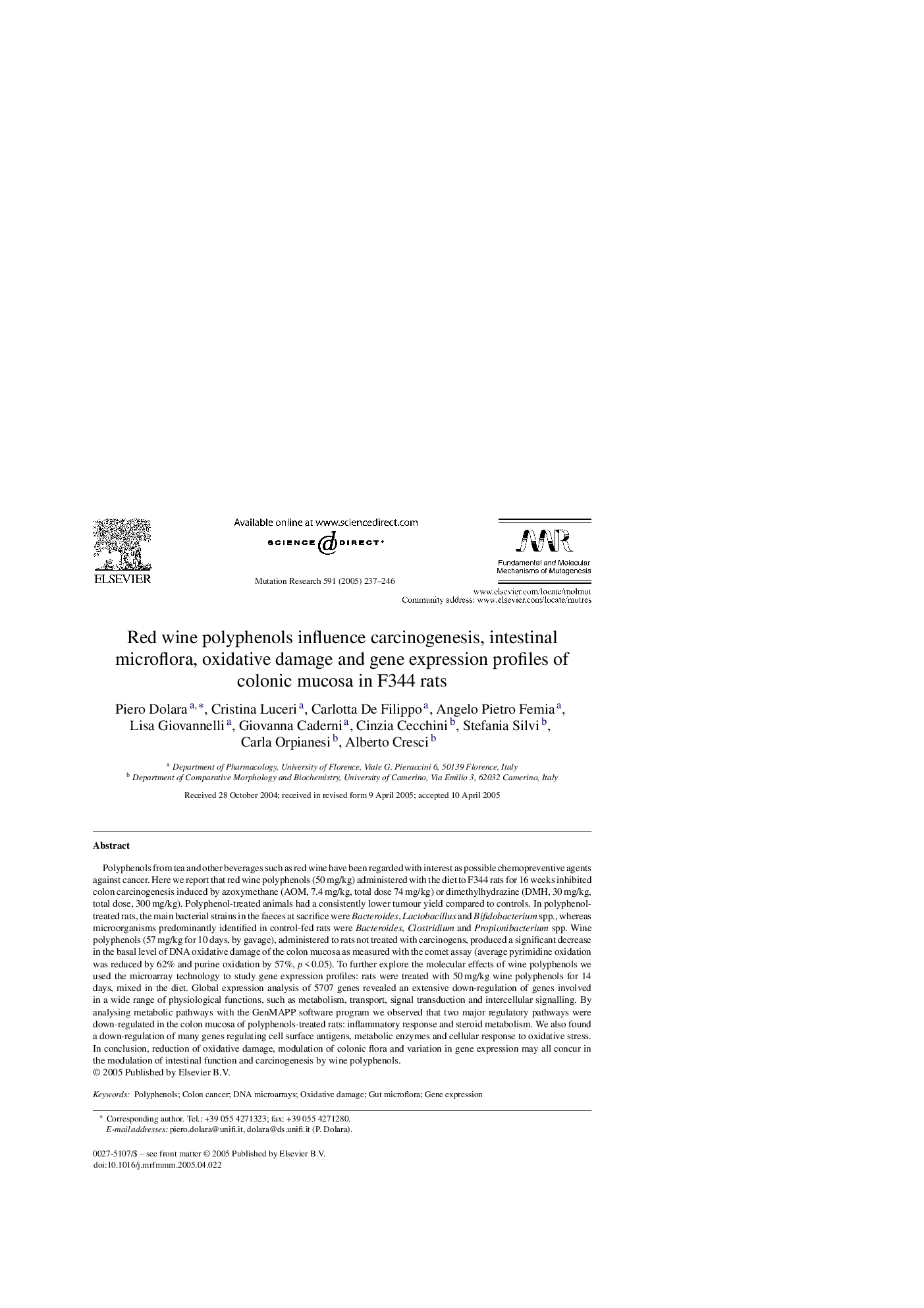| کد مقاله | کد نشریه | سال انتشار | مقاله انگلیسی | نسخه تمام متن |
|---|---|---|---|---|
| 9908975 | 1548427 | 2005 | 10 صفحه PDF | دانلود رایگان |
عنوان انگلیسی مقاله ISI
Red wine polyphenols influence carcinogenesis, intestinal microflora, oxidative damage and gene expression profiles of colonic mucosa in F344 rats
دانلود مقاله + سفارش ترجمه
دانلود مقاله ISI انگلیسی
رایگان برای ایرانیان
کلمات کلیدی
موضوعات مرتبط
علوم زیستی و بیوفناوری
بیوشیمی، ژنتیک و زیست شناسی مولکولی
تحقیقات سرطان
پیش نمایش صفحه اول مقاله

چکیده انگلیسی
Polyphenols from tea and other beverages such as red wine have been regarded with interest as possible chemopreventive agents against cancer. Here we report that red wine polyphenols (50 mg/kg) administered with the diet to F344 rats for 16 weeks inhibited colon carcinogenesis induced by azoxymethane (AOM, 7.4 mg/kg, total dose 74 mg/kg) or dimethylhydrazine (DMH, 30 mg/kg, total dose, 300 mg/kg). Polyphenol-treated animals had a consistently lower tumour yield compared to controls. In polyphenol-treated rats, the main bacterial strains in the faeces at sacrifice were Bacteroides, Lactobacillus and Bifidobacterium spp., whereas microorganisms predominantly identified in control-fed rats were Bacteroides, Clostridium and Propionibacterium spp. Wine polyphenols (57 mg/kg for 10 days, by gavage), administered to rats not treated with carcinogens, produced a significant decrease in the basal level of DNA oxidative damage of the colon mucosa as measured with the comet assay (average pyrimidine oxidation was reduced by 62% and purine oxidation by 57%, p < 0.05). To further explore the molecular effects of wine polyphenols we used the microarray technology to study gene expression profiles: rats were treated with 50 mg/kg wine polyphenols for 14 days, mixed in the diet. Global expression analysis of 5707 genes revealed an extensive down-regulation of genes involved in a wide range of physiological functions, such as metabolism, transport, signal transduction and intercellular signalling. By analysing metabolic pathways with the GenMAPP software program we observed that two major regulatory pathways were down-regulated in the colon mucosa of polyphenols-treated rats: inflammatory response and steroid metabolism. We also found a down-regulation of many genes regulating cell surface antigens, metabolic enzymes and cellular response to oxidative stress. In conclusion, reduction of oxidative damage, modulation of colonic flora and variation in gene expression may all concur in the modulation of intestinal function and carcinogenesis by wine polyphenols.
ناشر
Database: Elsevier - ScienceDirect (ساینس دایرکت)
Journal: Mutation Research/Fundamental and Molecular Mechanisms of Mutagenesis - Volume 591, Issues 1â2, 11 December 2005, Pages 237-246
Journal: Mutation Research/Fundamental and Molecular Mechanisms of Mutagenesis - Volume 591, Issues 1â2, 11 December 2005, Pages 237-246
نویسندگان
Piero Dolara, Cristina Luceri, Carlotta De Filippo, Angelo Pietro Femia, Lisa Giovannelli, Giovanna Caderni, Cinzia Cecchini, Stefania Silvi, Carla Orpianesi, Alberto Cresci,